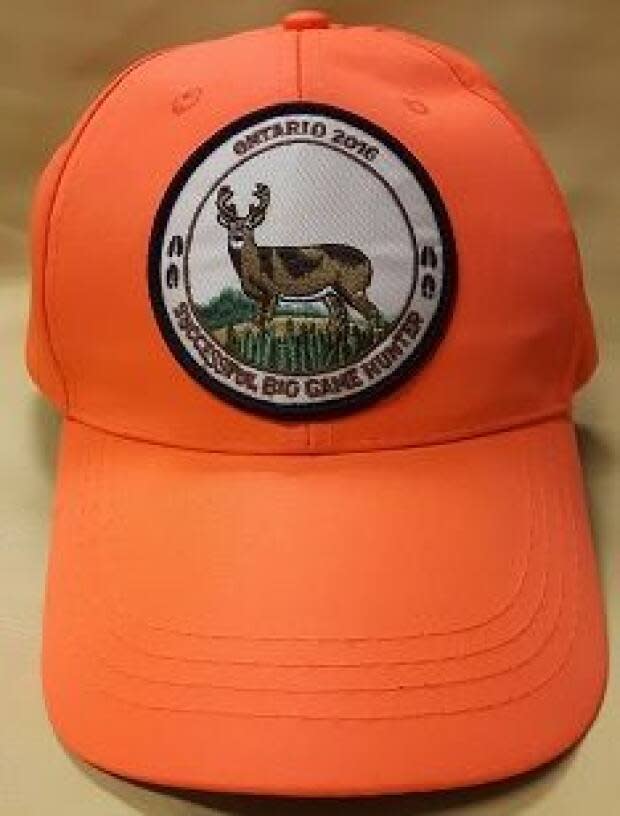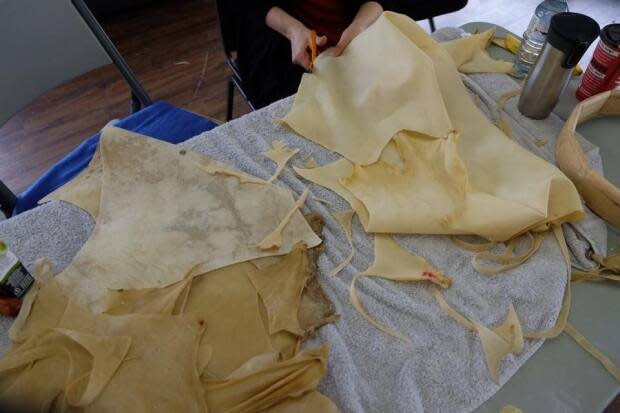Program encouraging hunters to donate hides in jeopardy
Hats for Hides, an Ontario program that encourages hunters to donate deer and moose hides to Indigenous craftspeople, appears to be on its last legs thanks to a combination of COVID-19 and shifting global economics.
The initiative, which dates back to the early 1970s, was originally set up by the Ministry of Natural Resources to prevent hides from being wasted and get them into the hands of Indigenous craftspeople. In exchange, hunters would receive a bright orange hat and crest proclaiming a successful hunt.
It's going to mean that a lot of hunters are throwing their hides in the bush. - Cheryle Brant-Maracle, former Hats for Hides depot operator
But a combination of factors has rendered the Hats for Hides program virtually defunct.
There are now just 11 depots accepting donated hides, down from 35 last year and 50 not long ago. The remaining depots are spread unevenly across the province, making it inconvenient for many hunters to drop off hides.

The private company that administers the program, BRT Provisioners of Peterborough, Ont., warned hunters that Hats for Hides would be extremely limited in 2020.
"Unfortunately, COVID has affected all markets and deer hides are no exception," the company said in a letter to hunters.
Now, instead of receiving a free hat, hunters who donate a deer hide may purchase a crest. A moose hide will earn you a free crest. "The only reason we're doing crests is that they were all pre-ordered before COVID hit," said Barb Thompson, the Hats for Hides program coordinator at BRT Provisioners.
"It's just a trophy, but for the avid hunter it's very important," said Cheryle Brant-Maracle, a former depot operator in Tyendinaga Mohawk Territory. "It's going to mean that a lot of hunters are throwing their hides in the bush."
"It's what they hang above the fireplace on the wall," said Steve Lantz, a depot operator in Durham, Ont., who refused to charge hunters for the 2020 crests, instead paying for them out of pocket. "If we don't do that, we'd never get enough hides."

According to BRT Provisioners, "deer hides have little to no value in this current COVID market," because the pandemic has sidelined the community gatherings where tanned leather is bought and sold. Virtually all powwows were cancelled in 2020 as organizers complied with public health directives.
"I travel from powwow to powwow selling leather and fur. I haven't been able to travel all year, and that's how I make my money," said Brant-Maracle.

Rodney St. Denis, an Algonquin artisan and cultural practitioner from the Kibaowek First Nation, now living in North Bay, Ont., would also sell his crafts at local powwows. He makes miniature teepees, canoes and tikinagans (baby cradle boards) using leather as embellishments.
But COVID-19 has closed that avenue off. "I didn't have the means to go out into public gatherings as I normally would," St. Denis said.
"With no powwows, we're sitting on leather and hide that we haven't moved since last year," said Greg Mance of White Tanning Co. in Rockwood, Ont.
Ultimately, it's what caused depot operators such Brant-Maracle to reluctantly bow out. "I know a gentleman that has every single crest … for as long as they've been given out. So to not get a 2020 crest from me is a little disappointing for him," she said.

Not just COVID-19
But COVID-19 is only part of the picture, according to Steve Lantz, a depot operator in Durham, Ont. He blames cheap leather imports.
Lantz said a tanner in Guelph told him they're able to source leather from China "cheaper than they can by a rawhide from an abattoir here.... This one you can't blame on COVID."
Offshore competition pushed Barrett Hides Inc. of Barrie, Ont., out of business in 2019. It had been picking up hides across much of southern Ontario. When it went bust, Hats for Hides depot operators had to truck their own hides, driving more of them out of the business, according to Lantz.
Ultimately, cheap leather may be the death knell for the Hats for Hides program. "You can't even get [a hide] for free, put salt on it … and get it to a tannery and come out with any money," said Thompson.
In May 2019, on the heels of the Barrett Hides Inc. closure, the Ontario government stepped in to save Hats for Hides with a one-time injection of $100,000 for BRT Provisioners to help buy and distribute hats and crests.
When contacted by CBC, the Ministry of Natural Resources and Forestry said in a statement it "has not received any request for support or funding for 2020," nor is it "aware of how COVID-19 has impacted the supply, collection and sale of hides."
"I don't want their money. It comes with way too many strings attached," said Thompson. "They don't do it to help the program. They do it for political votes."

